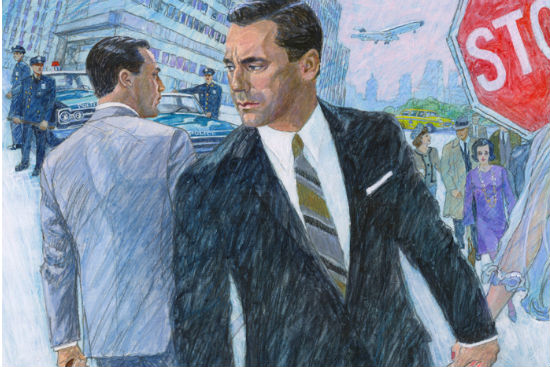
Hopefully you have been following the stellar sixth season of Mad Men on AMC. If you haven’t already heard from your persistent friends and family – Mad Men is arguably the best show currently on television. To those of you only recently picking up Matthew Weiner’s smoky, Scotch-laden boardroom drama – you might find it ironic Mad Men is perhaps most symbolically a show about women.
There’s little secret women have struggled mightily to establish a level playing field in regards to employment opportunities, an ongoing yet otherwise soft-spoken battle that continues to this day. I realize I’m hardly a whistle blower when I say women have traditionally been constrained into caretaker roles, vacuous and unfulfilling existences aimed at serving auxiliary roles toward the men they have sworn themselves to.
These disproportionate ethics are expertly displayed in a show like Mad Men, a show that authentically captures the uncertainty of the 1960s – a time where even capable and powerful women emerging in the workplace were still regarded as bystanders. While Mad Men never explicitly acknowledges this reality, the real merit of the show is its skillful ability to convey this theme implicitly through the actions of the ‘Mad Men’ that comprise the agency.
The always glib Don Draper is a great catalyst for this emerging theme. His decisions, often executed with a certain coolness, greatly affect the lives of Peggy Olsen and Joan Harris – two very powerful women in their own right that have worked tirelessly to achieve their accolades. Somehow, despite their highly varied yet similarly astute efforts, these women ultimately find themselves marginalized as mere collateral. This is Don Draper’s world – they just happen to be in attendance. And the right man can wipe away clean the intensive effort of any woman here.
Joan represents this hopelessness internally, working alongside Don at his budding agency. Joan is pressured into prostituting herself to achieve a semblance of power through the company, but there is no denying her mental tenacity in her willingness to do so – it’s somehow admirable. Joan realizes the cards are stacked against her gender and decides to manipulate the game by falling back on her understated intelligence. And with the snap of a finger, Don Draper dumps the client Joan sacrificed the remainder of her self-respect to acquire.
Peggy longed for an existence as more than simply Don Draper’s protégé, and only recently had her natural talents and abilities been acknowledged to the point of affording her that opportunity. Peggy eventually did step outside of Don’s widely cast shadow and into the arms of a successful and competing agency. A few casual cocktails with Peggy’s new employer in a dimly lit bar proved enough for Don to merge the two rival agencies, placing Peggy under a familiar thumb and undermining her entire career growth in the same stroke. Peggy can succeed but only on Don’s terms.
Mad Men is one of the best shows on television because it takes exception with this reality, highlighting the absurdity of it all in a genuinely captivating demeanor. Matthew Weiner’s series mirrors current society back at us and dangerously asks, “Are things really that much different?”.